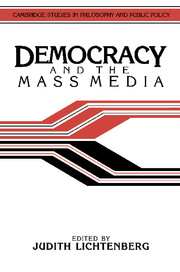Book contents
- Frontmatter
- Contents
- Preface
- List of contributors
- Introduction
- 1 Liberal constraints on private power?: reflections on the origins and rationale of access regulation
- 2 Liberalism and free speech
- 3 Foundations and limits of freedom of the press
- 4 Why the state?
- 5 Practices of toleration
- 6 Access in a post–social responsibility age
- 7 Who decides?
- 8 Four criticisms of press ethics
- 9 Political communication systems and democratic values
- 10 Mass communications policy: where we are and where we should be going
- 11 Content regulation reconsidered
- 12 The rationale of public regulation of the media
- 13 The role of a free press in strengthening democracy
- Index
7 - Who decides?
Published online by Cambridge University Press: 05 June 2012
- Frontmatter
- Contents
- Preface
- List of contributors
- Introduction
- 1 Liberal constraints on private power?: reflections on the origins and rationale of access regulation
- 2 Liberalism and free speech
- 3 Foundations and limits of freedom of the press
- 4 Why the state?
- 5 Practices of toleration
- 6 Access in a post–social responsibility age
- 7 Who decides?
- 8 Four criticisms of press ethics
- 9 Political communication systems and democratic values
- 10 Mass communications policy: where we are and where we should be going
- 11 Content regulation reconsidered
- 12 The rationale of public regulation of the media
- 13 The role of a free press in strengthening democracy
- Index
Summary
The First Amendment is not so much about truth as about power. To all but the most resolute moral or epistemological skeptic, many determinations made pursuant to First Amendment law or free speech principles involve the protection of ideas or arguments we commonly take to be false or invalid. We conscript young men and sacrifice their lives not because we believe the Nazis different but because we believe them wrong. We outlaw slavery and discrimination on the basis of race and gender because we think those activities morally reprehensible, and our reaction to those who assert the healthfulness of cigarettes or the safety of Pintos is something other than the ambivalence we reflect when as eaters of strawberry ice cream we encounter someone who prefers butter pecan.
Thinking about questions such as these, in which our actions and our discourse belie a moral or epistemological skepticism, prompts us to consider the close relationship, perhaps even the identity, between a theory of free speech and a theory of comparative personal and institutional competence. If we can with so little difficulty locate many instances in which our ability to distinguish the true from the false is not a sufficient justification for government to entrench the true and suppress the false, then we must search for reasons of institutional design and allocation of power that would disable an institution from acting on a correct decision about factual, scientific, or moral truth.
- Type
- Chapter
- Information
- Democracy and the Mass MediaA Collection of Essays, pp. 202 - 228Publisher: Cambridge University PressPrint publication year: 1990
- 1
- Cited by

